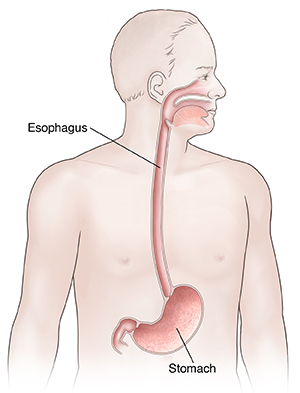The esophagus is the tube that connects the throat to the stomach. Esophagitis is an inflammation of the lining of the esophagus. This occurs most often from acid reflux or an infection. The most common cause of infection is a fungus called candida. This infection is also known as thrush.
The symptoms of esophagitis often depend on how much damage has been done to the lining of the esophagus. You may have pain or trouble with swallowing. You may also have a fever and bleeding. If this condition is left untreated, the esophagus can become scarred. Scarring may narrow the esophagus and lead to permanent trouble swallowing.
In adults, esophagitis with candida infection is most common in people who have HIV/AIDS. A weak immune system from other causes may also result in the infection. It may also sometimes affect people who have had chemotherapy or radiation, or use inhaled steroid medicines. Smoking, antibiotics, and dentures may also increase the risk of esophagitis. People with diabetes and adrenal insufficiency may also be at risk. Other risk factors include older age, dry mouth, and use of medicines called proton pump inhibitors.
Your healthcare provider may diagnose candida esophagitis based on your medical history and a physical exam. In some cases, your provider may do an endoscopy. This means looking inside the esophagus with a small tube and light.
Candida esophagitis often goes away with treatment. To prevent it from coming back, your provider must also treat factors that helped lead to the infection. Treatment often depends upon what caused the infection.
-
If antibiotics or corticosteroids are the cause, reducing the dose or changing the treatment may help.
-
Dryness of the mouth can be treated by keeping the mouth moist through hydration, ice chips, or lozenges.
-
If dry mouth is a side effect of a medicine, switching to another medicine or changing the dose may be an option.
Home care
-
If your provider has prescribed medicines, take them as directed. Call your provider if you have questions about the medicines or have side effects.
-
To help prevent irritation of the throat, don't eat spicy foods such as pepper, chili powder, curry, or nutmeg. Don't eat hard foods such as nuts, crackers, or raw vegetables. Also don't consume acidic foods or drinks such as tomatoes, oranges, grapefruits, or citrus juices.
-
Until you can swallow without pain, follow a liquid and soft diet. Include such foods as applesauce, cooked cereals, mashed potatoes, and soups.
-
Rinse your mouth with water after using an inhaler.
-
Take small bites and chew your food well.
-
Don't drink alcohol and don't smoke.
-
Practice good oral hygiene.
-
Take good care of your teeth and gums.
-
Clean dentures well with prescribed cleaning solutions.
-
Have regular dental checkups. Tell your dentist about your infection and the medicines you are taking.
-
If you have diabetes, keep your blood sugar levels under control.
Follow-up care
Follow up with your healthcare provider, or as advised.
When to seek medical advice
Call your healthcare provider for any of the following:
-
Increasing pain with swallowing
-
Inability to eat or drink
-
Dizziness or weakness
-
Fever of 100.4ºF (38ºC) or higher, or as directed by your healthcare provider
-
Symptoms that get worse or new symptoms


